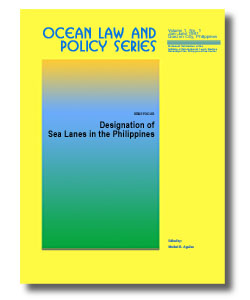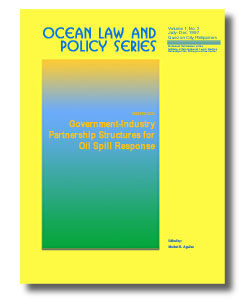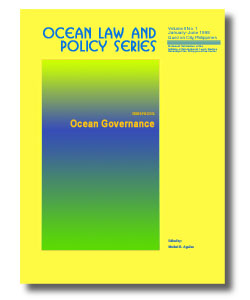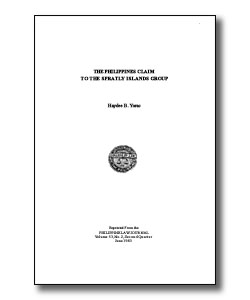UP LAW CENTER'S
INSTITUTE OF INTERNATIONAL LEGAL STUDIES
OCEAN
LAW AND POLICY SERIES
 This
bi-annual publication reflects the strong commitment of the UP Law Center's
Institute of International Legal Studies (IILS) to the Law of the Sea Program,
especially with respect to sustaining an effective communication link between
the academic community, practitioners in government and nongovernment entities,
and policy and decision makers.
This
bi-annual publication reflects the strong commitment of the UP Law Center's
Institute of International Legal Studies (IILS) to the Law of the Sea Program,
especially with respect to sustaining an effective communication link between
the academic community, practitioners in government and nongovernment entities,
and policy and decision makers.
Designation of Sea Lanes in the Philippines
Volume I No. 1 January-June 1997
Edited by Maribel B. Aguilos
162 pages • PhP200 or $15
 Contains
the technical considerations, legal and constitutional issues, and political
aspects of designating archipelagic sealanes of the Philippines. It also features
papers on Philippine archipelagic waters as well as local laws and congressional
initiatives in the Philippines.
Contains
the technical considerations, legal and constitutional issues, and political
aspects of designating archipelagic sealanes of the Philippines. It also features
papers on Philippine archipelagic waters as well as local laws and congressional
initiatives in the Philippines.
Governement-Industry Partnership Structures
for Oil Spill Response
Volume I No. 2 July-December 1997
Edited by Maribel B. Aguilos
228 pages • PhP250 or $19
 Documents
the proceedings of the roundtable discussion on government-industry partnership
structures for oil spill response in Canada, Japan, and the Philippines. The
perspectives of industry, energy department and Philippine Navy were highlighted
in the issues and challenges of oil spill structure in the Philippines. The
legal dimensions, oil exploration activities, and marine pollution management
in the Philippines were also discussed. International documents, related local
laws and initiatives, and pollution cases/incidents in the Philippines were
also printed.
Documents
the proceedings of the roundtable discussion on government-industry partnership
structures for oil spill response in Canada, Japan, and the Philippines. The
perspectives of industry, energy department and Philippine Navy were highlighted
in the issues and challenges of oil spill structure in the Philippines. The
legal dimensions, oil exploration activities, and marine pollution management
in the Philippines were also discussed. International documents, related local
laws and initiatives, and pollution cases/incidents in the Philippines were
also printed.
Ocean Governance
Volume II No. 1 January-June 1998
Edited by Maribel B. Aguilos
201 pages • PhP250 or $19
 Presents
the roundtable discussion proceedings where Jay Batongbacal discussed “Karagatang
Pilipino: A Critique and Proposed Revision of the National Marine Policy”.
Several reactions were given with respect to national marine policy and law
of the sea; institutional and policy issues in implementation; role of the
Office of the President and Congress in ocean policy; and national security.
This publication on ocean governance also featured a paper by Maribel B. Aguilos
on options for the Philippines in designing an institutional structure. The
case of Ecuador, particularly domestic policies and legislation versus the
United Nations Convention on the Law of the Sea (UNCLOS) was also described.
The documents contained in the issue are the provisions of the Philippine
Constitution and Local Government Code relevant to ocean governance, Executive
Order No. 186, and Chapter 17 of Agenda 21.
Presents
the roundtable discussion proceedings where Jay Batongbacal discussed “Karagatang
Pilipino: A Critique and Proposed Revision of the National Marine Policy”.
Several reactions were given with respect to national marine policy and law
of the sea; institutional and policy issues in implementation; role of the
Office of the President and Congress in ocean policy; and national security.
This publication on ocean governance also featured a paper by Maribel B. Aguilos
on options for the Philippines in designing an institutional structure. The
case of Ecuador, particularly domestic policies and legislation versus the
United Nations Convention on the Law of the Sea (UNCLOS) was also described.
The documents contained in the issue are the provisions of the Philippine
Constitution and Local Government Code relevant to ocean governance, Executive
Order No. 186, and Chapter 17 of Agenda 21.

Marine Transportation
Volume III Nos. 1&2
January-December 1999
Edited by Maribel B. Aguilos
and Rogelio C. Camaya Jr.
375 pages • PhP250 or $19
 Focuses
on the future of marine transportation as an industry that is intimately linked
to the country’s economy, environment and security. The Section on Roundtable
Discussion Proceedings brings the readers to the country’s first comprehensive
forum on maritime transportation that brought together 67 participants representing
the government, industry and academic sectors to discuss about reforming the
country’s maritime sector. The important event entitled “Roundtable Discussion
and Policy Analysis Workshop on Marine Transportation” was held on 19-21 January
1999 at the UP National Center for Transportation Studies, and through the
collaborative efforts of the Institute of International Legal Studies, the
Philippine Center for Marine Affairs, Inc., the UP Center for Integrative
and Development Studies, and the Oceans Institute of Canada. The forum started
with an overview of the national and global state of marine transportation.
The global perspective is contributed by Professor Edgar Gold, an eminent
international scholar of marine transportation law and policy. The Conference
Report entitled “A Reform Agenda for the 21st Century” is in the Notes Section.
Another article in this section is on the agenda of the Philippine Congress
on the reforms in the country’s marine transportation sector as can be gleaned
from “Legislative Initiatives on Marine Transportation” by Mary Ann Palma.
In the Feature Papers Section, Professor Chia Lin Sien and his colleagues
at the National University of Singapore look at maritime services liberalization
in their paper entitled, “Liberalization of Marine Transport Services: Directions
and Options for Asia.” Another featured paper, “Cabotage” by the Philippine
Center for Marine Affairs, Inc. gives a comprehensive analysis of the subject.
In the Documents Section, some eight laws affecting marine transportation
are featured.
Focuses
on the future of marine transportation as an industry that is intimately linked
to the country’s economy, environment and security. The Section on Roundtable
Discussion Proceedings brings the readers to the country’s first comprehensive
forum on maritime transportation that brought together 67 participants representing
the government, industry and academic sectors to discuss about reforming the
country’s maritime sector. The important event entitled “Roundtable Discussion
and Policy Analysis Workshop on Marine Transportation” was held on 19-21 January
1999 at the UP National Center for Transportation Studies, and through the
collaborative efforts of the Institute of International Legal Studies, the
Philippine Center for Marine Affairs, Inc., the UP Center for Integrative
and Development Studies, and the Oceans Institute of Canada. The forum started
with an overview of the national and global state of marine transportation.
The global perspective is contributed by Professor Edgar Gold, an eminent
international scholar of marine transportation law and policy. The Conference
Report entitled “A Reform Agenda for the 21st Century” is in the Notes Section.
Another article in this section is on the agenda of the Philippine Congress
on the reforms in the country’s marine transportation sector as can be gleaned
from “Legislative Initiatives on Marine Transportation” by Mary Ann Palma.
In the Feature Papers Section, Professor Chia Lin Sien and his colleagues
at the National University of Singapore look at maritime services liberalization
in their paper entitled, “Liberalization of Marine Transport Services: Directions
and Options for Asia.” Another featured paper, “Cabotage” by the Philippine
Center for Marine Affairs, Inc. gives a comprehensive analysis of the subject.
In the Documents Section, some eight laws affecting marine transportation
are featured.
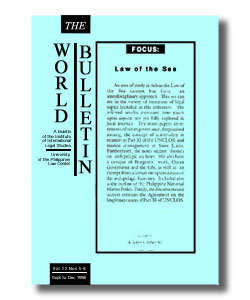
LAW OF THE SEA
The World Bulletin
Volume 12 Nos. 5-6 September to December 1996
Edited by Rolando S. dela Cruz
181 pages • PhP200 or $15
 THE
WORLD BULLETIN is a bimonthly publication devoted to the analysis and significant
changes and trends in the international situation. This particular issue on
the law of the sea is a collection of refereed articles on systems of ocean
governance, deep seabed mining, the concept of universality in relation to
Part XI of the UNCLOS, and marine management in Saint Lucia. There is a notes
section on archipelagic sealanes, a critique of Elizabeth Mann Borgese’s Ocean
Governance and the UN, and an excerpt from a lecture on optimization of the
archipelagic baselines. The Philippine National Marine Policy is also outlined.
In the documentation section, there is the Agreement on the Implementation
of Part XI of UNCLOS.
THE
WORLD BULLETIN is a bimonthly publication devoted to the analysis and significant
changes and trends in the international situation. This particular issue on
the law of the sea is a collection of refereed articles on systems of ocean
governance, deep seabed mining, the concept of universality in relation to
Part XI of the UNCLOS, and marine management in Saint Lucia. There is a notes
section on archipelagic sealanes, a critique of Elizabeth Mann Borgese’s Ocean
Governance and the UN, and an excerpt from a lecture on optimization of the
archipelagic baselines. The Philippine National Marine Policy is also outlined.
In the documentation section, there is the Agreement on the Implementation
of Part XI of UNCLOS.
THE PHILIPPNIE
NATIONAL TERRITORY:
A Collection
of Related Documents
Published by the IILS in cooperation with the Foreign Service Institute
636 pages • 1995
Paper Bound - PhP1000 or $75
Hard Bound - PhP1200 or $90
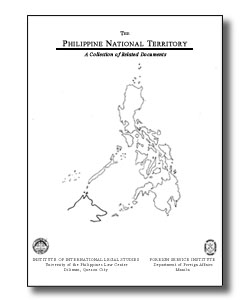
 This
book is the most comprehensive compilation of documents relevant to the Philippine
national territory in the country today. It is the result of painstaking effort
of Raphael Perpetuo Lotilla, a leading law of the sea scholar, former Director
of the UP Institute of International Legal Studies, and now Deputy Director
General of the National Economic and Development Authority.
This
book is the most comprehensive compilation of documents relevant to the Philippine
national territory in the country today. It is the result of painstaking effort
of Raphael Perpetuo Lotilla, a leading law of the sea scholar, former Director
of the UP Institute of International Legal Studies, and now Deputy Director
General of the National Economic and Development Authority.
 The
collection of documents in this preliminary edition is intended to promote
an enlightened discourse among the Philippine public on the concept of national
territory and the identification of its spatial dimensions. The documents
are arranged in chronological order, with formal denominations as well as
popular titles prominently indicated. Other sources of their documents are
recorded in the notes section following the text of each document. A subject
index and tables of international agreements, national issuances, and cases
are also included for the user’s convenience.
The
collection of documents in this preliminary edition is intended to promote
an enlightened discourse among the Philippine public on the concept of national
territory and the identification of its spatial dimensions. The documents
are arranged in chronological order, with formal denominations as well as
popular titles prominently indicated. Other sources of their documents are
recorded in the notes section following the text of each document. A subject
index and tables of international agreements, national issuances, and cases
are also included for the user’s convenience.
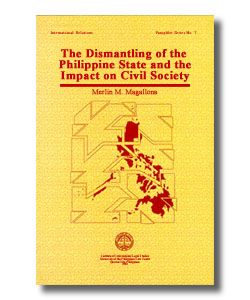
The Dismantling
of the Philippine State
and the Impact
on Civil Society
IILS Pamphlet Series No. 7
By Merlin Magallona
71 pages • 1996 • PhP50 or $4
 The
IILS Pamphlet Series provides a critical and constructive forum for the analysis
of new trends, issues and prospects in international relations that may help
clarify present problems and perspectives. The pamphlet's Issue No. 7 is based
on a UP professorial chair lecture which attempted to synthesize and interpret
certain contemporary events which are taking the Filipino nation as a whole
into a decisive turn of developments.
The
IILS Pamphlet Series provides a critical and constructive forum for the analysis
of new trends, issues and prospects in international relations that may help
clarify present problems and perspectives. The pamphlet's Issue No. 7 is based
on a UP professorial chair lecture which attempted to synthesize and interpret
certain contemporary events which are taking the Filipino nation as a whole
into a decisive turn of developments.
 Magallona
notes that the United Nations Convention on the Law of the Sea (UNCLOS), which
took effect in November 1994, will reorganize the territorial basis of the
state. The transformation of the Philippines into an "archipelagic state"
as this is understood under the UNCLOS will have long-term implications on
the Filipino people in terms of territorial integrity, national security and
environmental impact. Magallona extensively discusses the issues regarding
the country's archipelagic waters and sealanes.
Magallona
notes that the United Nations Convention on the Law of the Sea (UNCLOS), which
took effect in November 1994, will reorganize the territorial basis of the
state. The transformation of the Philippines into an "archipelagic state"
as this is understood under the UNCLOS will have long-term implications on
the Filipino people in terms of territorial integrity, national security and
environmental impact. Magallona extensively discusses the issues regarding
the country's archipelagic waters and sealanes.
Philippine Ports,
Shipping and Navigation Under the New
International Law of the Sea
Edited by Reynaldo B. Vea
and Ida Mae Fernandez
117 pages • 1995
Book Print - PhP150 or $12
Newsprint PhP100 or $8
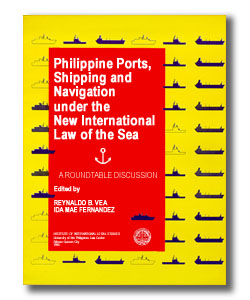
 Contains
the proceedings of a roundtable discussion to address the policy issues arising
from the Law of the Sea which have far-reaching implications on Philippine
national interests. The topics covered are as follows: maritime technology
issues involving ports, shipping, and navigation; the roles of the Philippine
Ports Authority and the International Maritime Organization; Philippine commercial
navigation problems; Philippine marine transport system and ocean policy;
and shipping and navigation regimes under the Law of the Sea Convention. The
conclusions and recommendations adopted were in the areas of maritime science,
technology, training and education; Philippine ports management; international
navigation through Philippine waters; shipping and marine pollution; and interim
institutional measures.
Contains
the proceedings of a roundtable discussion to address the policy issues arising
from the Law of the Sea which have far-reaching implications on Philippine
national interests. The topics covered are as follows: maritime technology
issues involving ports, shipping, and navigation; the roles of the Philippine
Ports Authority and the International Maritime Organization; Philippine commercial
navigation problems; Philippine marine transport system and ocean policy;
and shipping and navigation regimes under the Law of the Sea Convention. The
conclusions and recommendations adopted were in the areas of maritime science,
technology, training and education; Philippine ports management; international
navigation through Philippine waters; shipping and marine pollution; and interim
institutional measures.
PROBLEMS, PROSPECTS,
AND POILCIES: Non-living Marine Resources
of the Philippines
Edited by Teodoro M. Santos and Ida Mae Fernandez
150 pages •1993 • PhP150 or $12
 Contains
the proceedings of the roundtable discussion conducted on June 10-11, 1992.
The forum provided a venue for exchange of ideas on scientific, historical,
legal, and policy aspects of a national program for nonliving marine resources.
Contains
the proceedings of the roundtable discussion conducted on June 10-11, 1992.
The forum provided a venue for exchange of ideas on scientific, historical,
legal, and policy aspects of a national program for nonliving marine resources.
SPRATLY ARCHIPELAGO:
Is the Question
of Sovereignty
Still Relevant?
By Gerardo Martin C. Valero
95 pages • 1993 • PhP50 or $4
 Contains
the proceedings of a roundtable discussion on "The Spratly Islands Dispute"
held in January 1993. Valero's paper discussed territorial claims based on
historic title; claims arising from international agreements; and claims based
on occupation. The open forum included clarifications, comments, questions,
and suggestions of participants from various sectors on the Spratlys dispute.
95 pages • 1993 • PhP50 or $4
Contains
the proceedings of a roundtable discussion on "The Spratly Islands Dispute"
held in January 1993. Valero's paper discussed territorial claims based on
historic title; claims arising from international agreements; and claims based
on occupation. The open forum included clarifications, comments, questions,
and suggestions of participants from various sectors on the Spratlys dispute.
95 pages • 1993 • PhP50 or $4
The Philippine Claim to the Spratly Islands
Group
Reprinted from the Philippine Law Journal
Volume 53, No.2, Second Quarter, June 1983
By Haydee B. Yorac
pages 43-63 • PhP50 or $4
 The
paper gives an overview of the Philippine claim to the Spratly Islands Group;
discusses the claims of other countries including China, Vietnam, France,
Japan, and Malaysia; explains applicable rules in international law with respect
to territorial claims; and examines the legal grounds for the Philippine claim.
The
paper gives an overview of the Philippine claim to the Spratly Islands Group;
discusses the claims of other countries including China, Vietnam, France,
Japan, and Malaysia; explains applicable rules in international law with respect
to territorial claims; and examines the legal grounds for the Philippine claim.
![]() This
bi-annual publication reflects the strong commitment of the UP Law Center's
Institute of International Legal Studies (IILS) to the Law of the Sea Program,
especially with respect to sustaining an effective communication link between
the academic community, practitioners in government and nongovernment entities,
and policy and decision makers.
This
bi-annual publication reflects the strong commitment of the UP Law Center's
Institute of International Legal Studies (IILS) to the Law of the Sea Program,
especially with respect to sustaining an effective communication link between
the academic community, practitioners in government and nongovernment entities,
and policy and decision makers. 